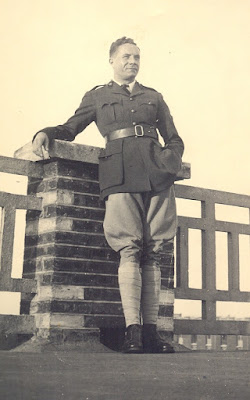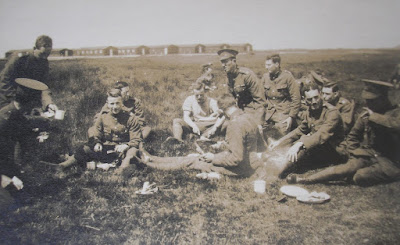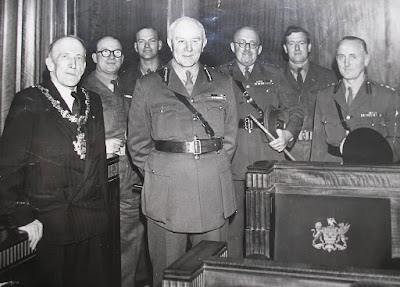New addition to the Major-General Francis O'Meara Collection
Last year the Heritage Centre was contacted Mme Odile Grimonpont-Caner whose father, Jean Caner, had known Major-General Francis O’Meara during the Second World War. She had found out that the Heritage Centre held some of O’Meara’s papers, and wanted to know if we would be interested in her father’s recollections of O’Meara. Naturally we said yes.
 |
| Jean Caner, 1940 |
Jean Caner was a dentist when he was drafted into the French Army in 1940. He was initially stationed in a military hospital in Marcoing in Northern France, where French and later British soldiers, from Dunkirk, were treated. In the autumn of 1940 some of the Scottish soldiers in the hospital escaped, and the German authorities increased restrictions and then moved the hospital to Cambrai. It was there, on 4th November 1940, that Jean Caner meet Francis O’Meara;
When a great event took place which livened up the monotony of our days, “a great event” if you like, with the arrival amongst us of an English, or more accurately an Irish, Dr, the Major-Dr O'Meara! His first names were Francis Joseph. Into the middle of the barracks, which was in a fair amount of disorder, we saw enter this British person, a tall and impeccably turned out subject of His Majesty. He had been driven, in a car if you please, to the prison, provided with a magnificent wicker travelling trunk by the French Defence Health Service, into which he had put his personal affairs. He said to us in all seriousness ‘I was taken by surprise at Hazebrouck’.
O’Meara had been in France since May 1940, when he was leading a motor ambulance corps out of Dieppe. He was captured by the German army that month and would spend the next four years in various prisoner of war hospitals and camps.
According to Caner O’Meara immediately introduced a more regimented way of life;
He reminded the French what was expected, as he would not accept any deviation from the rules because we were prisoners. We owed it to ourselves to obey the orders of the Germans. Following a strict daily timetable, [he] washed, shaved, cleaned his shoes and made sure his clothes were spotless. Then he sat down at a table and made notes on ‘illnesses in the Colonies’. At ten o'clock, a British soldier, one of many who were prisoners, reported to him, clicking his heels and saying ‘The News, sir’. Because, astonishing as it may seem, these cunning English devils had ferreted out a radio set and put it in the basement. Thus they could listen to the BBC and this soldier kept O'Meara up to date. When he had finished his report our Tommy turned, clicked his heels together and left in perfect English style. I said to myself that these lads were going to run rings round Fritz. When O'Meara learned that a certain Colonel de Gaulle was gathering his troops somewhere, he was delighted. ‘Aoh! That's good for us’ and as we had heard him remark that this situation could go on for a long time, we questioned him on the future: ‘Oh, four or five years, I think...the Germans are always quick workers at the start but later...’
 |
| Photograph of the RAMC from the O'Meara Collection, c.1930s |
The good doctor O’Meara clearly made a big impression on Jean Caner;
I admit that I came to have a lot of friendly feeling for F. J. O'Meara. He was an interesting character and came from a good family, he was a direct descendant – third generation - of Napoleon 1st's Dr on St Helena. He would ask me on most afternoons ‘Caner, would you like to take a turn with me?’ because he considered walking was good for the digestion. I was pleased to join him and we went out to do a circuit: the Major avoiding the puddles which might have dirtied his shoes and his cloth gaiters … F.J. and I thought alike and got on very well. One night, when enemy aircraft were flying over Cambrai, the Flak was very vigorous. F.J was so pleased to hear all this noise that he showered my blankets with sweets. He really was priceless.
On 13 December 1940 Jean Caner was released by the German authorities and sent home. Before he left Cambri he was given an address in London by O’Meara and told to keep in touch. In the words of Jean Caner, after the war ‘this unsinkable Briton resurfaced, regularly sending ‘My dear Caner his best wishes’ every Christmas’.
 |
| Major-General Francis J O'Meara, c.1950s |
The accounts of Jean Caner of his time in the French Army in 1940 and his meeting with Francis Joseph O’Meara have been added to the O’Meara collection and are available to researchers, both the original French version and an English translation.
You can view the full O’Meara collection list here.
Many thanks to Mme Odile Grimonpont-Caner for sharing her father’s reminiscences with the Heritage Centre, and to Jane Harvey for translating them.